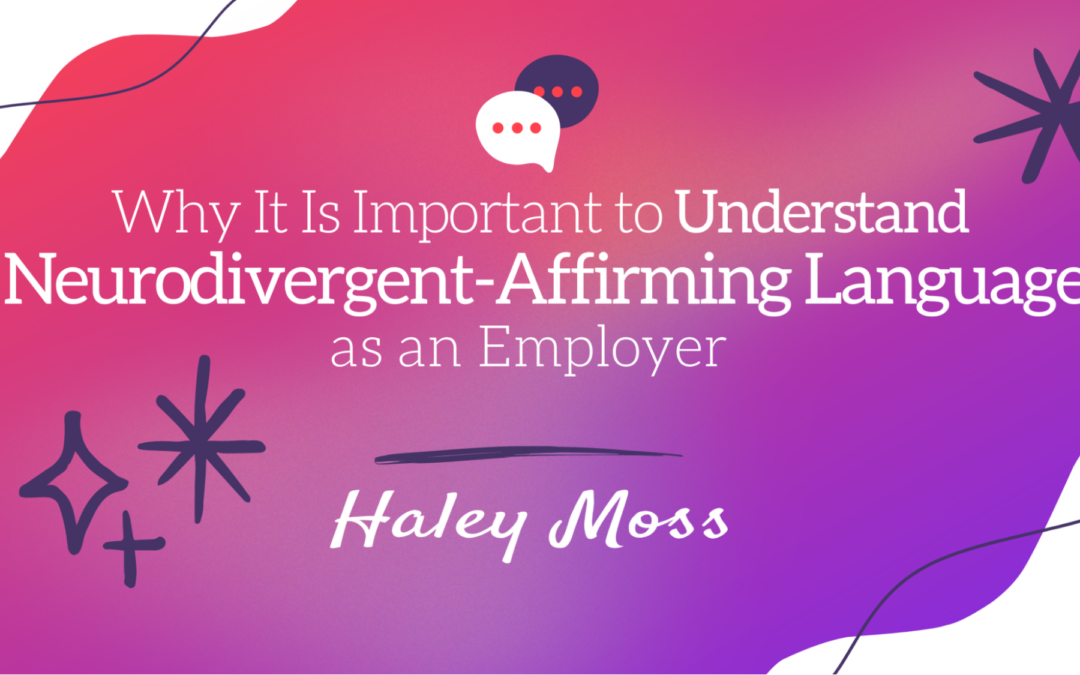The most significant way that organizations can implement a welcoming, supportive, and open workplace for neurodivergent individuals is by prioritizing education. Employers can hire neurodivergent employees, but that is not enough to ensure an equal-opportunity workplace. A further step must be taken to learn and adopt that education into your leadership structures.
One piece that is extremely important to acknowledge is the neurodivergent language. Before you bring on any neurodivergent employees, you want to gain a better understanding of the terms and phrases you might hear to ensure you can provide the best possible accommodations.
What Is Neurodivergent Language?
Neurodivergent language is the result of the acceptance movement within the community. It helps encourage, accept, and acknowledge neurodivergent existence. Certain terms and phrases are more positive than others, leading to a more affirming atmosphere when they are used. As an employer, knowing this language can ensure you are setting yourself and your business up for success when you hire neurodivergent individuals.
This Could Be Terms Such As…
- Neurodivergent
- Neurotypical
- Self-Stimulation/Stimming
- Masking
- Autism
- Dyslexia
- Dysgraphia
Additionally, you might find yourself using identity-first language out of respect or describing individual traits in ways that don’t contribute to stigma. For example, autistic individuals are likely to prefer the term “autistic” over ”person with autism.” This goes the same with using the phrase “variable support needs” rather than “high functioning/low functioning” and specific descriptions over challenging behaviors. Simple phrase changes can help empower neurodivergent individuals and fight stigma.
As an Employer, Understanding Neurodivergent Language Will…
Help Break Unconscious Biases
All of us are going to have unconscious biases; it is being human. However, in the workplace and as a leader, those biases can negatively impact your team members. By educating yourself and learning neurodivergent language and preferred phrasing, you can help combat your unconscious biases and break down the barriers within yourself so you can lead everyone equally. Breaking these biases is the first step to creating an equal-opportunity workplace.
Affirm Neurodivergent Identities
Many of the preferred phrases intentionally view neurodivergence as a part of a person’s identity and humanity. Neurodivergent individuals have acquired this mindset over the years, and now it’s time for everyone to get on the same page. When we recognize that neurodivergence is part of people’s identity and is not their entire personal hood, we can better respect, empower, and encourage them as we would anyone else. In the workplace, this mindset can help boost confidence and bring everyone together.
Set an Example for the Rest of the Organization
One of the most important reasons employers and leaders should learn, understand, and implement neuroinclusive language and phrasing in their organizations is to ensure that they are setting a proper example for their teams. Once you start using the right words within the right mindset, so will your team. It will positively impact everyone in the business and help spread equality.
Neurodiversity-affirming language and phrasing are essential within the workplace as they can help empower, encourage, and support neurodivergent employees. As their employer, it is your responsibility to learn and adapt. If you have further questions or wish to improve your business’s equality and mindset, contact me!

